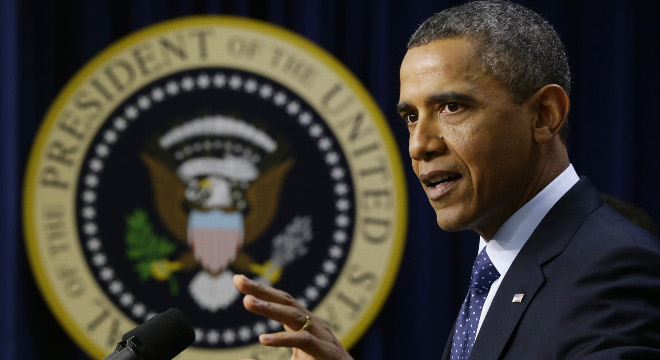Republicans reacted immediately and with tremendous hostility to President Obama’s remarks at the White House Monday afternoon, and accused him of jeopardizing a deal to avoid the fiscal cliff.
Senate Minority Leader Mitch McConnell and Vice President Joe Biden had been nearing agreement on legislation to avert broad tax increases and spending cuts next year, say aides with direct knowledge of the negotiations.
But the evolving framework is unsatisfactory to members of both parties, including members of Democratic leadership, and one Democratic aide described the whole process was “hanging by a thread.”
That was before Obama’s remarks, in which he boasted that the nascent plan would protect major progressive priorities, and attacked Congress for threatening to derail it before the end of the day when all of the Bush tax cuts expire. Obama also issued a key demand regarding an issue at the heart of the remaining differences between the parties.
“Revenues have to be part of the equation in turning off the sequester,” Obama said.
That may be a non-starter for Republicans.
As of early Monday afternoon, the Dems’ latest offer, which is still changing, would lock in the Bush era tax rates for income up to $400,000 per individual filer, ($450,000 per family). It would set identical thresholds for capital gains and dividends taxes, which would rise from 15 to 20 percent.
The estate tax would climb from 35 to 40 percent for estates worth $5 million or more. And two tax expenditure limitations — a personal exemption phase out and a limitation on itemized deductions — would be instated. The former would be set at $250,000. The deduction limit — called Pease, after the late Rep. Don Pease (D-OH) — would reduce the value of tax deductions above $250,000 in income ($300,000 for joint filers).
Altogether this would raise about $600 billion in revenue above the current policy baseline, according to another source familiar with the negotiations.
The key sticking point, however, is the sequester. Democrats have rejected a GOP offer to delay the sequester by three months. They want to extend that deadline by a full year. But Republicans have rejected Democrats’ request to defray the over $100 billion cost cost with revenue. President Obama, as he indicated at the White House, insists on at least splitting the difference and paying for part of the sequester delay with new revenue and the rest with spending cuts elsewhere in the budget.
It’s not clear whether Republicans can accept that demand.
Negotiators hope to include a permanent patch to the alternative minimum tax, and extend a variety of business tax credits for a year. They also hope to extend emergency unemployment benefits — a $30 billion spending measure — and current Medicare physician reimbursement rates, but remain at odds over whether and how to pay for them.
But Biden’s latest offer does extend by five years expansions of the Earned Income Tax Credit and the Child Tax Credit that were part of the 2009 recovery act.
Senate Democratic leaders will have the final say over any deal amenable to McConnell and the White House. But it’s hard to imagine them rejecting an offer amenable to the President. If Senate Republicans and Democrats come to terms on a deal Monday, the real question will be whether House Republicans allow it to come to a vote, and whether it would pass.










